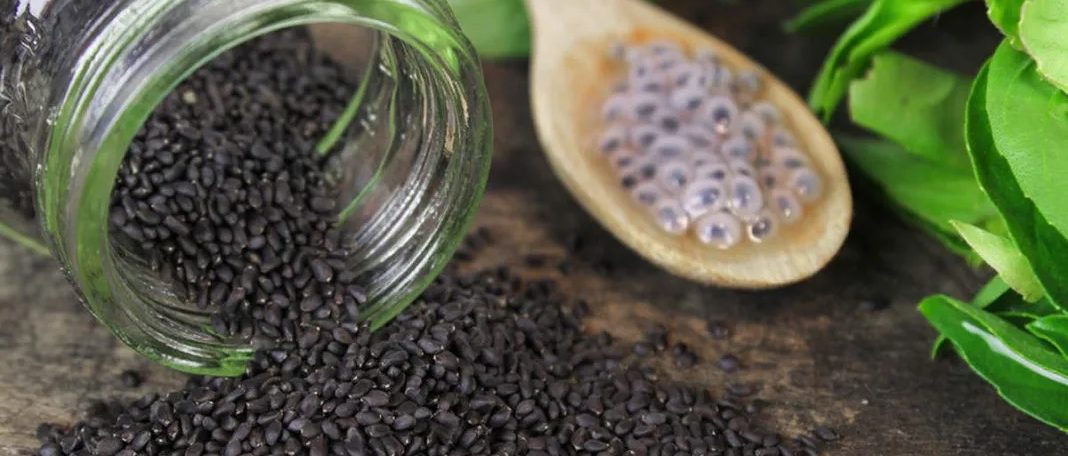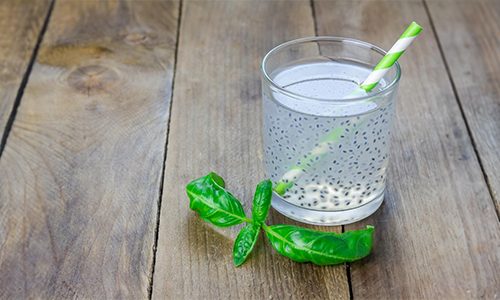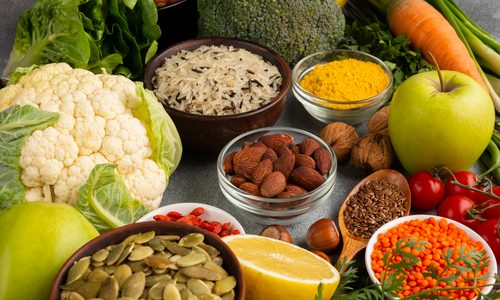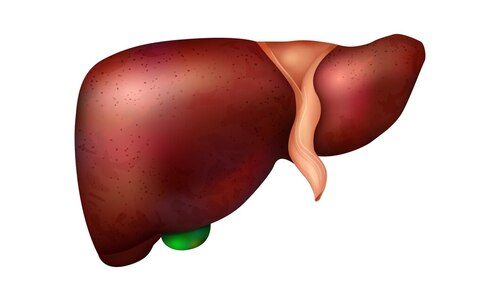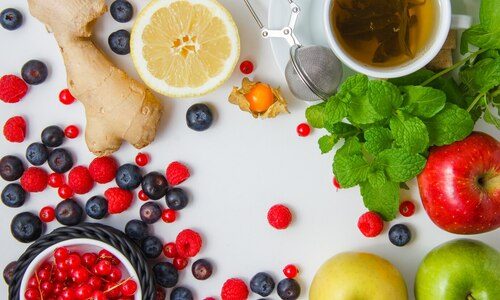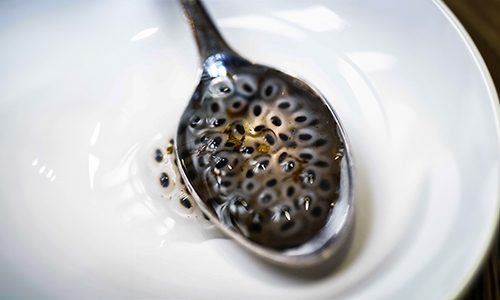What are Basil Seeds?
Basil seeds, also known as sabja seeds, or tukmaria seeds, are tiny, black seeds that come from the sweet basil plant. They are commonly used in traditional medicine and culinary practices in Southeast Asia and India. They are native to India and Southeast Asia, but they are now grown all over the world. In this blog, let’s discuss the health benefits of basil seeds, their advantages, how to use them, their nutritional value, and so on.
Nutritional Value of Basil Seeds
Including them in your meals, drinks, or desserts can not only enhance the flavor and texture but also provide a nutritional boost to your diet.
- Dietary Fiber
They are a rich source of dietary fiber, aiding digestion, maintaining bowel regularity, and potentially contributing to weight management by inducing a feeling of fullness. - Protein
Basil seeds contain a reasonable amount of protein, making them a valuable addition to vegetarian or vegan diets. - Essential Nutrients
They offer a range of nutrients, including iron, magnesium, and calcium, which support various bodily functions. - Healthy Fats
They contain heart-healthy omega-3 fatty acids, crucial for brain and cardiovascular health. - Low in Calories
They are low in calories, making them a guilt-free addition to your diet. - Antioxidants
They contain antioxidants that help protect cells from damage caused by free radicals, contributing to overall well-being.
30 Benefits of Basil Seeds
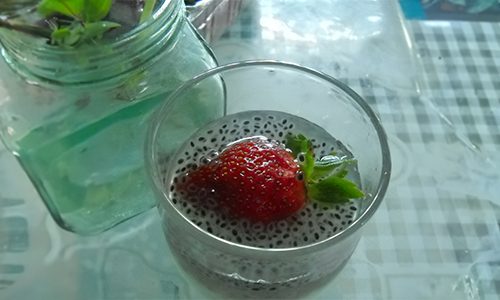
Realize the goodness of basil seeds by understanding their nutritional value and healthy properties. Here are some health benefits that will make you add them to your diet.
- Rich in Nutrients:
Foods such as greens, nuts, and berries contain essential vitamins and minerals that support the immune system, bone health and stamina - Weight Loss Aid:
Incorporating ingredients high in fiber, protein, and wholesome fat, inclusive of greens, lean proteins, and complete grains, can assist in manipulating appetite, enhancing metabolism, and promoting fat loss. - Digestive Health:
Probiotic-rich ingredients like yogurt and fermented greens, in conjunction with fiber-wealthy meals like culmination, greens, and complete grains, promote gut bacteria boom and facilitate smooth digestion. - Detoxification:
Leafy greens, cruciferous vegetables, and citrus fruits are rich in antioxidants and fiber, which aid in the elimination of pollution and assist liver characteristics. - Blood Sugar Regulation:
A balanced food plan containing complex carbohydrates, lean proteins, and healthy fats can help preserve blood sugar levels and decrease the probability of insulin resistance and diabetes. - Heart Health:
Omega-three fatty acids, fiber-wealthy ingredients, and antioxidant-rich fruits and greens contribute to coronary heart health via lowering levels of cholesterol and decreasing inflammation. - Anti-inflammatory Properties:
Turmeric, ginger, fatty fish, and olive oil are anti-inflammatory meals that may help lessen irritation and alleviate signs and symptoms of inflammatory conditions like arthritis and heart disorders. - Antioxidant Effects:
Berries, dark chocolate, green tea, and colorful culmination and veggies are rich in antioxidants like nutrients C and E, flavonoids, and polyphenols, which defend cells from oxidative harm. - Skin Health:
Vitamin C, E, zinc, and antioxidant-rich foods can decorate collagen manufacturing, guard against sun harm, and hold skin elasticity and hydration. - Hair Health:
Protein-rich foods like lean meats, eggs, and legumes, alongside biotin, vitamin E, and omega-3 fatty acids, sell hair growth, electricity, and shine. - Cooling Effect:
Cucumbers, watermelon, and mint are hydrating foods that help regulate frame temperature and keep you refreshed throughout hot climate. - Respiratory Health:
Vitamin C, vitamin E, and antioxidant-wealthy ingredients can beautify respiration fitness by lowering irritation, enhancing lung function, and promoting mucus clearance. - Stress Reduction:
Magnesium-wealthy foods like spinach and almonds, along with omega-three fatty acids and antioxidants, can assist lessen strain stages and promote rest. - Bone Health:
Calcium-rich foods, diet D, and magnesium-wealthy meals, in conjunction with dairy products, leafy veggies, fortified foods, and vitamin D, assist keep bone density and energy, reducing the hazard of osteoporosis. - Muscle Health:
Protein-rich foods like chicken, fish, tofu, and beans, together with branched-chain amino acids, are vital for muscle repair, boom, and renovation. - Improved Cognitive Function:
Foods rich in omega-three fatty acids, antioxidants, and mind-boosting vitamins like choline and diet E beautify cognitive features, reminiscence, and concentration. - Enhanced Immunity:
Vitamin C, D, zinc, and antioxidant-rich meals enhance immune function through growing white blood cell manufacturing, lowering irritation, and safeguarding against infections. - Alleviation of Headaches:
Magnesium-rich ingredients like nuts and seeds, hydration, riboflavin, and coenzyme Q10 can assist lessen headache frequency and severity. - Aid in Menstrual Health:
Iron-rich ingredients like lean meats and leafy vegetables, along with omega-three fatty acids and magnesium, can assist in alleviating menstrual cramps and alter menstrual cycles. - Regulation of Hormonal Balance:
Hormonal imbalance signs may be alleviated through eating meals rich in phytoestrogens, omega-three fatty acids, nutrition B6, and magnesium. - Improvement of Vision:
Vitamin A, lutein, zeaxanthin, and antioxidants are important vitamins in meals that promote eye fitness, lessen macular degeneration risk, and hold sharp imagination and prescient. - Antimicrobial Properties:
Garlic, onions, honey, and sure herbs comprise antimicrobial compounds that assist in combatting bacteria, viruses, and fungi, reducing the threat of infections. - Support for Liver Health:
Cruciferous veggies, beets, garlic, and green tea are rich in vitamins that are useful resources in liver cleansing, lessening infection, and protecting against liver damage. - Reduction of Bad Breath:
Consuming hydration-rich, fiber-rich ingredients, and chlorophyll-rich foods like parsley and mint can help freshen breath and decrease the boom of odor-inflicting bacteria. - Anti-allergic Effects:
Quercetin-wealthy foods like apples, onions, and berries, the side with omega-3 fatty acids and probiotics, can assist in alleviating hypersensitivity signs and infection. - Boosted Metabolism:
Spicy foods, protein-wealthy ingredients, and caffeine-containing foods can temporarily improve metabolism and increase calorie burning. - Aid in Insomnia:
Consuming meals rich in tryptophan, magnesium, and melatonin precursors, alongside natural teas like chamomile and valerian root, can beautify relaxation and sleep. - Promotion of Healthy Gut Flora:
Prebiotic foods like garlic, onions, and bananas, along with probiotic-rich meals like yogurt and kefir, sell gut bacteria growth and beautify digestion. - Alleviation of Joint Pain:
Consuming foods rich in omega-three fatty acids, turmeric, ginger, and glucosamine can help lessen infection, decorate joint mobility, and alleviate arthritis signs and symptoms. - Natural Antioxidant Source:
Berries, green tea, dark chocolate, and nuts are abundant resources of antioxidants, which shield cells from oxidative damage and decrease the likelihood of persistent sicknesses.
How to Use Basil Seeds?
Having two spoons of basil every day has numerous health benefits. While you can eat them raw, they can be hard to chew. So, consider soaking or cooking them to form a soft mushy mass, and add them to smoothies, yogurt, oatmeal, etc. You can also make basil seed tea or pudding. Alternatively, soak them for a few hours and consume them in plain water.
Caution
- The seeds present a choking hazard for children, so ensure adult supervision.
- Pregnant women should avoid taking basil seeds as it may reduce estrogen levels.
Simple Recipe for Basil Seed Pudding
Ingredients
- 1 tablespoon basil seeds
- 1/2 cup milk of your choice
- 1 tablespoon honey or maple syrup (optional)
- 1/4 teaspoon vanilla extract (optional)
Instructions
- Combine the seeds and milk in a jar or glass.
- Stir to combine and cover.
- Let stand for at least 30 minutes or overnight.
- Stir again before serving.
- Add honey or maple syrup and vanilla extract to taste (optional).
How to Include Sabja Seeds in Your Diet?
Here are some easy ways to incorporate Sabja seeds into your daily routine:
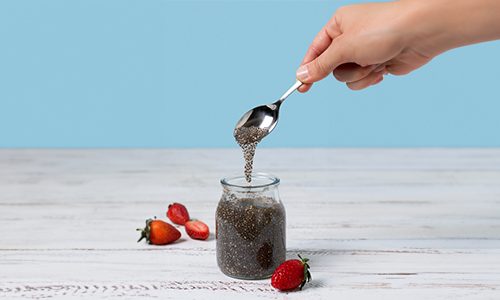
Soaking Method
Soak a tablespoon of Sabja seeds in a cup of water for 10 to 15 minutes, allowing them to absorb water and form a gel-like texture. Add this gel to various dishes.

Desserts and Puddings
Use soaked seeds in creamy desserts like puddings, custards, or chia seed puddings for added texture and nutritional benefits.
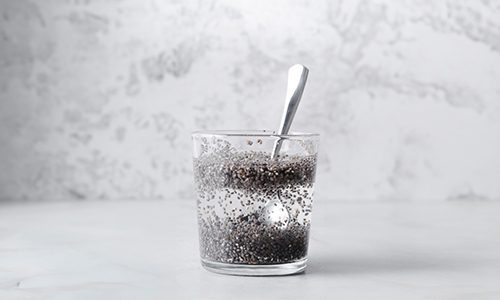
Refreshing Drinks
Add soaked seeds to beverages like lemonades, iced teas, smoothies, or plain water for a refreshing twist. Try a sip and enjoy the benefits of drinking basil seeds.
Yogurt and Parfaits
Sprinkle them over yogurt bowls, parfaits, or overnight oats for a nutritious and filling breakfast or snack.
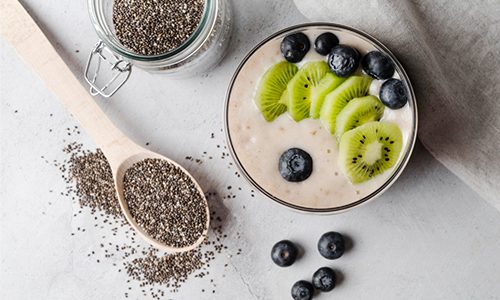
Salads and Soups
Boost the nutritional value of salads and soups by adding soaked Sabja for a crunchy texture.
Baking and Cooking
Incorporate Sabja seeds into baking goods like bread, muffins, and cookies, or use them as a topping for various dishes, including curries and roasted vegetables.
Final Words
Remember to start with small quantities and gradually increase as per your preference. Realize the health benefits of basil seeds and incorporate them as part of a balanced diet to reap their nutritional benefits for digestion and overall well-being.









